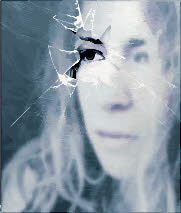
| HOME |
| NERVE |
| REVIEWS |
| ARCHIVE |
| EVENTS |
| LINKS |
| ABOUT US |
| CONTRIBUTORS |
| BACK ISSUES |
| CONTACT US |
A Lot Of It About
 Written
by Ned Hopkins
Written
by Ned Hopkins
Directed by Alex Shepley
Organised
Chaos Productions
Lantern Theatre (10th-11th May 2013)
Reviewed by Kitty Spathia
Hopkins tells me with twinkling blue eyes that the true story on which A Lot Of It About is based was re-told here with the individual’s blessing. With a few tweaks, the life events lend themselves well to a play, which is an indicator of how shocking and unreal attitudes towards homosexuality have been, and in a more pernicious way still are, in Britain.
A Lot Of It About is more than a good story - the plot is filled out lavishly with Hopkins' sharp and sometimes subtle humour. Many of the lines made me feel dirty-minded just smirking at them. In the scene where Ben as an old man (played by Daniel Thackerey with a good physical impersonation of a geriatric), reflects on his life’s experiences to a friend he’s just met in the park. The audience was either too innocent to pick up on the funny filth, or were too polite to show it.
- "Winter’s lovely…Snow all around your ankles…
- ‘Yeah, that’s all that’s around my ankles."
-"You’re good company when you shut up!’
-‘Yeah, you made sure of that…"
Has the theatre lost the prerogative to be understated our time? While retrospectively processing a life riddled with discrimination and tribulation (a heterosexual marriage and aversion therapy amongst them), quick quips are not just a relief; they are a tool for making sense of life’s cruel twists and turns.
And Organised Chaos get this. The cast’s ability to carry off weighty scenarios respectfully and with maturity belies their average age.
We open with an encounter in the park and the audience braces itself to get into ‘follow closely’ mode but it turns out there’s no need – the scenario is so fluid and the actors carry you wistfully along it. The audience is continually shown different perspectives (even the protagonist is played by a Younger and Older self, Thackeray and Michael Whittaker), and as part of the cast on stage are often looking on at the action, the audience is made to feel as if they’re joining them in the viewing experience.
It’s important that this play gets seen because Organised Chaos are able to do justice to a tale of prejudice and vilification that needs to be acknowledged. Sanjay Sutar as psychiatrist puts across how in 1960s Britain, being gay was cause for being paranoid. It provides unique insight into awkward perilous situations which the majority of society can't glimpse. There is an intimate portrait of a post-coital scene followed by a cringeworthy break-up.
The internal monologues many of us may engage in sometimes are brought to life on stage, as we see ourselves in Old Ben berating Young Ben after the motorbike accident or the helplessness of naïve Young Anne (Kate Mitchell) as she sits on the marital bed for the first time with her gay husband.
The stereotyping of mental health professionals initially seemed in bad taste: the same posh accents, the same thick glasses and lab coats. I wondered how we can get rid of the homosexuality label without getting rid of labeling the educated. However, the Psychiatrist in the play came to represent the way Ben’s perspective of his social landscape: a bland and uniform set who don’t indulge emotional nuances. Everyone’s individuality appears to have been suppressed, it’s just that Ben’s happened to include being gay. This production was a responsible and engaging portrayal of a very sensitive issue which needs a good airing.
Broken
 By
Ella Carmen Greenhill
By
Ella Carmen Greenhill
Directed by Paul Anderton
Organised
Chaos Productions
Lantern Theatre (10th-11th May 2013)
Reviewed by Kitty Spathia
I took a ride on a Ferris wheel the night I went to see Broken, only for some reason I was looking over a strange couple arguing over candy floss instead of a view…and then I wasn’t even sure I was looking at a couple, but rather one young woman and her imaginary date. Somehow we found ourselves not on a Ferris wheel, but in a park… a car…a hospital bed.
The young woman was May played by Hannah Keeley, though I’m not sure May herself knew who she was. There’s something ominous radiating off the stage from the outset, even from Clara (Emma Cliff)'s approachability in the park. Then Keely shifts like watercolours from The Little Mermaid to Sylvia Plath in one scene. She turns from saccharine teenager to phobic and anxious, and the audience finds itself trying to ‘diagnose’ the character. We flow from May to a washed out health professional Helen (Una Love) who we can’t be sure is playing a deeply neurotic role, or initially nervous about her stage debut. The questions build up:
Could the two women be the same person? What was the trauma? Are they both experiencing reality and if not, which one of them is real?
Is it because we’re only metres away from the actors that they seem so real and their words so deeply felt, or is it their proximity that makes the actors all the more talented for covering up the cracks between fiction and reality?
May’s delusions rub off on Helen as she starts to ruminate over the medication she prescribes and her own authority. Our eyes shift from one actress to the other and from one reality to the next. As the structures that the characters put forth fall apart, the characters themselves become all the more convincing.
The highpoint of versatility is when May’s character is transformed by Keeley into a debilitated Patient, drugged up and inarticulate, giving the appearance of being bound by ropes. Suddenly it dawns on the audience that this play could be what’s going on inside the heads of those who appear like this in shopping centres or institutions.
Monologue by monologue the story is drawing together and harsh reality become apparent.
May, pointing at a lake: ‘It looks like a fish but it’s not
really is it?’
Clara: ‘…It’s just the case. He’s gone somewhere
else, somewhere better!,’
May: ‘Is he happy?’
‘Yeah, well happy’, Clara and the Clinician chime.
Broken is a must-see for anyone interested in vulnerable members of society, or the ambiguity human experience.
Organised Chaos showcased two plays and while one is about sexual orientation, and the other is about mental health, what lies beneath these descriptions are the issues of neglect, abuse and discrimination involved in experiences of them. Organised Chaos managed to fluidly present both ‘minority groups’ from the inside looking out.
It was nice to see a tight, real and gritty but not self-conscious production. The audience can take a load off and leave concerns about interpretation and delivery up to the theatre company, which is what the theatre-going experience should be about. The only blunder on Blundell Street is that promotion was poor, which meant only a handful of theatre-goers got the chance to experience Organised Chaos in Liverpool.